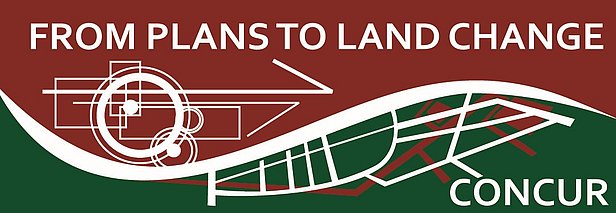CONCUR - From Plan to land change
Franziska Schmid
2015 - 2020
Contents

From plans to land change: how strategic spatial planning contributes to the development of urban regions
Project information ¶
The overall objective of the CONCUR project is to analyse and operationalize how spatial planning and spatial policies affect land change in urban regions. This highly interdisciplinary project is ultimately aiming to develop a scientific basis for adequately integrating spatial policies into quantitative land-change modelling approaches at the urban regional level. To do it so, the project distinguishes three components intended to better analyse the role of spatial planning and spatial policies in the development of urban regions.
The three components are:
- Planning intentions which refer to spatially explicit information in maps and/or text that visualize and describe the development of spatial visions;
- Governance arrangements representing the overall activity through which plans are made and implemented;
- External conditions reflecting supra-national conditions affecting plan making and plan implementation.
These three components are crucial for understanding the role of spatial planning in urban land-use change and for better linking the spatial planning and land change domains (Hersperger et al. 2018).
The spatial focuses of this project are urban regions. Urban regions are defined in this project as multi-functional territories composed of a core city (i.e. the urban area) and a surrounding area with fuzzy boundaries that have statutory meanings (e.g. an institutionalized regional government) or are the result of informal governance arrangements and multi-level government cooperation.
Project structure ¶
- Evaluation of strategic spatial plans, is aimed at developing a sound understanding of strategic spatial planning by conducting planning evaluation research on the intentions expressed in the strategic plans of urban regions specifically regarding landscape science issues, green infrastructures (Gradinaru et al 2018) and land degradation (Oliveira et al. 2018).
- Assessment of strategic spatial plan making and plan implementation processes in European urban regions is aimed at developing a framework - the SPlaMI framework for Strategic Spatial Plan-Making and Plan-Implementation. The framework provides an overarching conceptualisation of the main components and key interrelationships of strategic spatial planning.
- Tools for integrating planning in land change models (e.g. CLUMondo) is aimed at operationalizing the understanding of planning intentions, governance arrangements and external conditions; at developing tools and procedures to collect relevant data; and at implement planning into a land change model.
- Case studies Zurich, Bucharest, Austin, Texas (USA), is aimed at analysing spatial planning and land change through mixed research methods in the urban regions of Zürich (Switzerland), Bucharest (Romania), and Austin, Texas (US). Findings resulting from the projects on planning evaluation and components of strategic planning processes will support the development of this project.
News feed ¶
-
Full tack at GLP OSM 2019 Conference in Bern entitled "Quantifying the transformative capacity of strategic planning: novel method and evidence from two European urban regions"
-
Flash talk at GLP OSM 2019 Conference in Bern entitled "Effects of planning efficiency for nature protection in peri-urban open spaces"
-
Upcoming Expert Workshop "Advancing computational processes to translate multifaceted aspects of spatial planning into land change models", WSL Institute, Birmensdorf (ZH), Switzerland, November 27th, 2018
-
Upcoming article: Palka G., Grădinaru S.R., Jørgensen G., Hersperger A.M. (in press) Visualizing planning intentions: from heterogeneous information to maps. Journal of Geovisualization and Spatial Analysis.
Associated projects ¶
Additional links ¶
- Global LAND Project
- The Landscape Research Center WSL
- CONCUR on Researchgate
